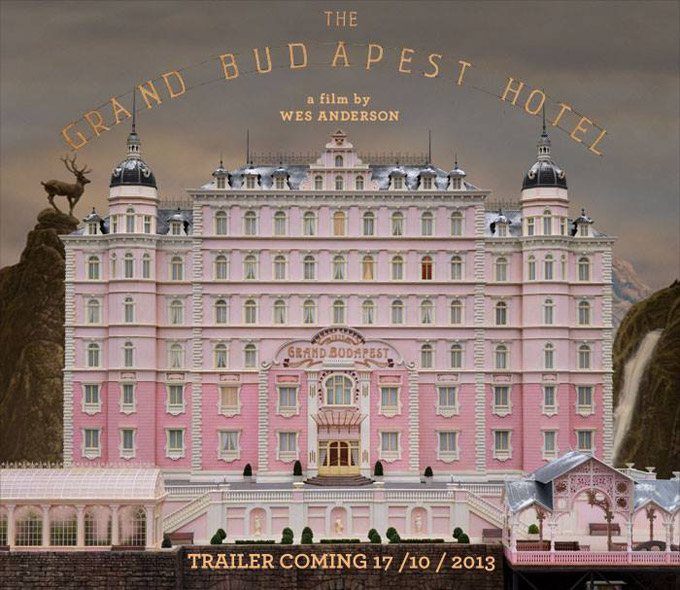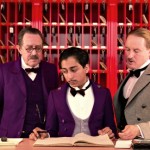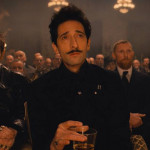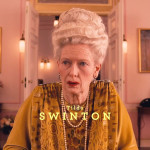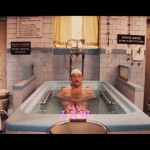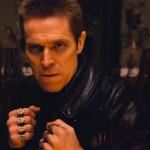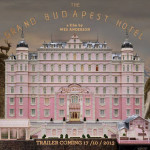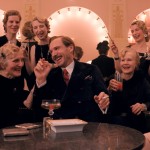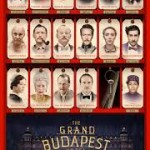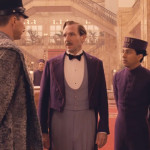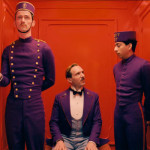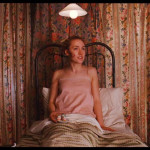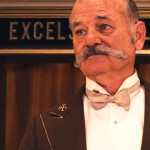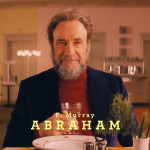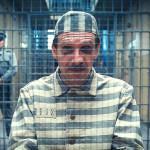As preparation for seeing Wes Anderson‘s new movie, I watched another Wes Anderson movie. No, not The Royal Tenenbaums (which I included among my list of least favourite movies of all time) but The Darjeeling Limited, a competent and wordy travelogue with a glittering cast about three brothers on a spiritual journey across India by train and other modes of transport. A colourful movie to be sure, reminding me strongly of my own time in India, but not a film that held my attention. Perhaps it’s a trifle madcap, the narrative rushed and the whole a little less than the sum of its wonderful parts. Perhaps it’s a stylistic thing but somehow that coup-de-Anderson did not quite agree with me. It isn’t quite as funny and charming as it wants to be or thinks it is.
Fast forward to another colourful madcap adventure that will in all probability polarise audiences for the same reasons mentioned above. The Grand Budapest Hotel, “inspired by” the writings of Stefan Zweig, perhaps the most hyped movie of the year to date. It is a star-laden vehicle in surrealism that some will find a hoot, while others will find the zany style disagreeable. TGBH starts with the premise one stage removed from reality (which reminds me of the old joke: “He’s absolutely Dagenham – three stops beyond Barking“) but a good review should never start with preconceptions.
Maybe in places it is reminiscent of Feydeau at his hairiest but, but unlike Feydeau it is not true farce. Why? Because farce depends for success on a credible and deadpan depiction of normality before the wheels come off and chaos ensues, where reality here is hyper-real. No, not farce but certainly a knowing sort of caper movie, following in a great tradition and defined thus:
The caper story is a subgenre of crime fiction. The typical caper story involves one or more crimes (especially thefts, swindles, or occasionally kidnappings) perpetrated by the main characters in full view of the reader. The actions of police or detectives attempting to prevent or solve the crimes may also be chronicled, but are not the main focus of the story. The caper story is distinguished from the straight crime story by elements of humour, adventure, or unusual cleverness or audacity
Ah, but there are the trailers to consider, often the best 2 minutes far out of the 120. “That looks crap,” said one friend on the strength of TGBH’s trailer. It was however film of the week according to the estimable Mark Kermode. A movie to polarise opinion then, but can we draw from that any objective truths? Let’s start with the cast:
- Ralph Fiennes as M. Gustave H.
- F. Murray Abraham as Mr. Moustafa
- Mathieu Amalric as Serge X.
- Adrien Brody as Dmitri Desgoffe-und-Taxis
- Willem Dafoe as J.G. Jopling
- Jeff Goldblum as Deputy Kovacs
- Jude Law as Young Writer
- Harvey Keitel as Ludwig
- Bill Murray as M. Ivan
- Edward Norton as Inspector Henckels
- Saoirse Ronan as Agatha
- Léa Seydoux as Clotilde
- Jason Schwartzman as M. Jean
- Tilda Swinton as Madame D.
- Tom Wilkinson as Author
- Owen Wilson as M. Chuck
- Tony Revolori as Zero Moustafa
- Bob Balaban as M. Martin
As I say, more stars than you can shake the proverbial stick at, mostly American with a few Brits and others added for good measure. Note also the links to the Coppola empire, given that Roman, son of Francis, is a regular Anderson collaborator – though not on this picture – and Schwartzman is son of Talia Shire, sister to Francis and Connie Corelone in The Godfather. The only surprise is that Coppola’s nephew Nicholas Cage (né Coppola) didn’t get a look-in somewhere along the line. Certainly explains a few of the Anderson connections into the industry, though some credence should be given to Anderson’s pulling power as a director in his own right.
Note also that the three main stars of Darjeeling Limited (Brody, Wilson, Schwartzman) are given decent parts in TGBH, and that Murray also appeared in the earlier movie and collaborated in other projects – part of the Anderson rep company (look at the table in Wikipedia’s entry on Anderson and many more such connections will be apparent.) However, the greatest screen time is devoted to a complete unknown, Tony Revolori, in his scene-stealing role as the hotel lobby boy, for whom an international casting search was conducted, with credit since Revolori lets nobody down.
So then, high production values guaranteed and delivered, and you might suppose this adds gravitas to the Anderson oeuvre that seems lacking when you consider the earlier movies individually and collectively. Nonetheless, this comment from Rotten Tomatoes is worthy of further analysis:
“Typically stylish but deceptively thoughtful, The Grand Budapest Hotel finds Wes Anderson once again using ornate visual environments to explore deeply emotional ideas.”
Hence, I went to the screening in search of a deeper emotional subtext to what is a typically Mittel-European tale of comic intrigue. If it could live up to Tom Stoppard’s On The Razzle, a retelling of Johann Nestroy‘s Viennese farce Einen Jux will er sich machen, then Anderson would be doing very well. Stoppard is a man of ideas, a true intellect with roots in the heart of the European firmament; Anderson is a Texan Europhile, dating a Lebanese writer and actress and spending a great deal of time in Paris – and indeed Germany, where TGBH was shot. Anderson is writer, director and producer, so this is firmly his movie, regardless of inspiration.
As it turns out I need not have worried, since this is, to my eyes, far and away Anderson’s finest work to date. Starting with the look, the German connection and period setting (1985, 1968 and, for the bulk of the action, 1932) delivered exquisitely to the style and ambience of this movie, and would not have been anything like as charming set in modern America – a common Hollywood conceit. As with Darjeeling Limited, strong bold colours dominate, apart from the portion of history set in the Soviet era, when drab dominates. It is beautifully done, a masterpiece of production design, locations, set dressing, costume and cinematography. Camera angles are logical and occasionally adventurous without inducing motion sickness; special effects and stunts are deliberately kept simple; the look and feel works in every particular. The Grand Budapest Hotel itself matches the scale and proportions you would expect, both in its heyday and the near-empty 1968 Soviet-era version.
The plot is great caper material (full plot copied from Wikipedia below), and Anderson keeps it rattling along apace; unlike Darjeeling Limited the clarity is all the greater for plot pointers being signposted visually and aurally. Where Darjeeling has many mumbled lines, these are enunciated beautifully – as you might expect at a genteel hotel where the guests and staff are equally well educated.
Key to success if your star-studded cast are going to perform is a zesty script. To my surprise this Anderson script is razor-sharp, snappy and deliciously funny throughout. Best of all, it doesn’t run out of steam, never loses its pointed edge, even if the language is coarser than justified, and provides many more golden moments than preserved in the trailer. As with many farces and capers, Anderson has his cast delivery lines at breakneck speed, but the quality of lines is there to be enjoyed; it would probably take two or more trips to pick up all the best one-liners.
To praise an actor I’ve been known to criticise before now, Ralph Fiennes (or to give him his full name, Ralph Nathaniel Twisleton-Wykeham-Fiennes) picks up his words and runs with them. This is quite possibly the performance of a career, as honed a characterisation as I’ve known him deliver, and talking of delivery his timing is exquisitely spot on. In fact, American accents notwithstanding (about my only bugbear with Amadeus), all the cast play their cameos with swashbuckling panache. The calmest and most authoritative performance is that of the ageing Mr Moustafa (F Murray Abraham, excellent as always), and special mention too for Willem Dafoe as a deliciously sinister villain and Tilda Swinton in unexpected and heavily made-up guise as the aged murder victim whose will sets off the chase. But in truth, not one performer gives less than their best and every last one is highly watchable.
So, contrary to my expectations, I embrace a hugely entertaining 99 minutes of breezy farcical nonsense, of which my only other criticism is that for a caper film a couple of slightly gory scenes are superfluous and add nothing to the overall effect. But contrary to the view of Rotten Tomatoes, I wouldn’t go looking too hard for subtext and hidden meanings. Appreciate this film at face value, spotting the occasional nod to other caper movies along the way, and enjoy it for what it is – Wes Anderson to the max!
The film opens in the present as a teenage girl approaches a statue in a courtyard. In her arms is a memoir penned by a character only known as “The Author.” She begins reading a chapter about a trip he made to the Grand Budapest Hotel in the late 1960s. Located in the Republic of Zubrowka, an Eastern European nation ravaged by war and poverty, he discovers that the remote, mountainside hotel has fallen on hard times. Much of its lustrous facilities are now dilapidated and its guests are few and far between.
The Author encounters the hotel’s owner one afternoon and they agree to meet later that evening. Over dinner in the hotel’s enormous dining room, he tells him the tale of how he took ownership of the Grand Budapest and why he’s unwilling to close it down.
The owner’s story begins in 1932 during the final years of the hotel’s glory days. Zubrowka is on the verge of war but this of little concern to Gustave, the Grand Budapest’s devoted concierge. When he isn’t attending to the needs of the hotel’s wealthy clientele or managing its staff, Gustave courts a series of aging, blonde women who all flock to the hotel to enjoy his “exceptional service.” One of them is Madame D. During her final stay at the hotel, Gustave spends the night with her prior to her departure.
A few days later, he’s informed that Madame D has died under mysterious circumstances. He races to her wake where he learns that she bequeathed him ‘Boy With Apple,’ a valuable painting, in her will. This enrages her family, all of whom hoped to inherit it, especially her son, Dmitri Desgoffe-und-Taxis. After Gustav hides the painting in a safe at the Grand Budapest, Gustave is arrested and framed for the murder of Madame D.
Meanwhile, the hotel’s new lobby boy, a teenager named Zero, aids him in escaping from a maximum security prison. Along with a group of hardened cons, Gustave digs his way out of his cell. They part ways and Gustave teams up with Zero to prove his innocence. Their adventure takes them to a mountaintop monastery where they meet with Serge X, the only person who can provide Gustav with an alibi for the night of Madame D’s murder.
They are pursued by J.G. Jopling, a cold-blooded assassin who manages to kill Serge. Zero and Gustave steal a sled and chase Jopling as he flees the monastery. During a clash on the edge of a cliff, Zero manages to kill the assassin and rescue his mentor.
Back at the Grand Budapest, the military has commandeered the hotel and is in the process of turning it into a bunker. The outbreak of war is now imminent. A heartbroken Gustave vows to never again pass the threshold. They are joined by Agatha, Zero’s young wife. She agrees to go inside to retrieve the painting but is discovered by Dmitri. A chase and a gunfight ensue before Gustave’s innocence is finally proven via a confessional letter, penned by Serge, that was hidden in the painting’s frame.
A different version of Madame D’s will is soon discovered as well. It reveals that she was the mysterious owner of the Grand Budapest. She leaves much of her fortune, the hotel and the painting to Gustave, making him fabulously wealthy in the process. He becomes one of the hotel’s regular guests and later grants Zero ownership. Meanwhile, the war rages on all around them.
During a train trip, soldiers search Gustave’s carriage and he’s shot and killed during an argument. Zero vows to continue his legacy at the Grand Budapest but the ongoing conflict and the ravages of time slowly begin to take their toll. Agatha succumbs to a disease and dies a few years later.
The hotel’s owner, now revealed to be an aging and devastated Zero, confesses to the Author that he can’t bring himself to close the hotel because it’s his last link to his dearly departed wife and the best years of his life. The Author later departs for South America and never returns to the hotel, leaving both it and Zero’s ultimate fate unknown. Back in the present, the girl finishes reading the chapter about the Grand Budapest and leaves the courtyard.

